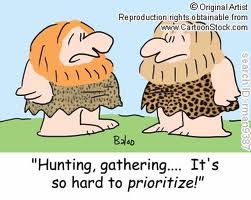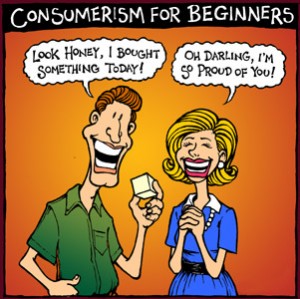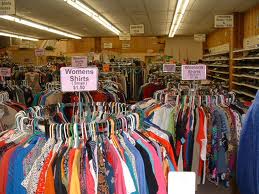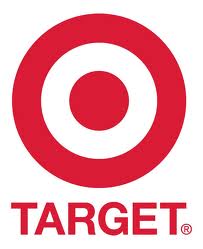Smart Bargains and Shopping Deals - Why We Buy Things
We Shop Thinking We Know Smart Bargains
As we shop we are bombarded with signs and messages telling us about prices and discounts As we walk through the store, we are talking to ourselves and telling ourselves what items appear to be smart bargains. We think we won’t be fooled. We tell ourselves, we are savvy shoppers, we know prices, we know values, and we have willpower to only buy what we need. This is what we tell ourselves. What we do, is sometimes entirely different. Why is that?
We shop with the best of intentions. We know smart bargains await us, and we will find them. But our thinking is not always as clear as we are aware of, and sometimes we come home with “stuff “and wonder why we bought it in the first place. Shopping has emotional components to it. Marketers, manufacturers and retailers know this. In fact, they know us better than we know ourselves. And so when we walk through a store, we are outwitted by those who make a living studying the buying behavior of ordinary people. How do they do this?

The Skill of Finding Smart Bargains
- The fear of missed opportunity. Sometimes when we see a sale we think, that we have to buy it now. We may never see this price again, or we might not get the clothes in our size or the color or style we want. We feel the pressure that we must purchase it now, and that is why many stores have limited time sales. Those 4 hour sales peak our emotions and stop us from thinking logically about need and the true cost of smart bargains. We feel like we won something when we got a bargain others did not. This is part of the thinking that affects people on sale days like Black Friday.
- When we shop and see markdowns, a competitiveness comes over us. There is an unconscious aggression towards other shoppers who might take the smart bargains away from us. Finding out the product we were interested in is sold out, can be a let down, and we want to avoid feeling left out or let down.
- Marketers have studied buyers and have noted that touching an item increases the probability that the customer will purchase it. So, as we sort through the table to find the right size, we are making an emotional commitment to seek, find and conquer. We want to win the treasure. As we hunt, psychologically and unconsciously, we are raisng the value of the item in our mind. When we find what we are looking for, we have convinced ourselves this is worth buying because we perceive the items as smart bargains,. We feel we must have it.
- Getting smart bargains actives the pleasure sense in our brain. It releases dopamine and so, we are in a kind of drugged state when we have made a decision that we believe is beneficial. The rational thinking we started with when we walked into the store has been clouded by chemical changes in our brain. It has changed our perception, our thinking, and our unconscious motivations.
- We make assumptions, and sometimes with skewered perceptions. Seeing the words sale, markdowns, price cuts, discounts, twofers, 60% off, etc. we lose some sense of logical thought. We get impulsive and skip the thought processes that would help us determine whether it is qualifies as smart bargains or not. It becomes easy for us to lose our skill of logic and reasoning.
- Shoppers can be overwhelmed by too much selection and sometimes shoppers will go right to the sale rack to easily get what is marked down. Too much variety can make a consumer mentally tired, and in fact, studies have shown that men will usually just walk out of a store if they feel overwhelmed by too much selection. Shopping from the sale rack gives a sense of comfort for people who are looking to buy.
- When we buy things on sale, our thought patterns tell us we saved money. It gives us the feeling that we didn’t spend, because we got value for our dollar. This is the thinking of why people use coupons and end up buying products they may not ever have bought, because they feel like they got a deal.
- Pricing an item ending in 99 cents tends to lead us to drop the 99 cents and make the price seem lower.and more appealing to us and gives us the perception that it is a smart bargain. Numbers ending in ‘0’ are easier to remember and easier for a consumer to do price comparisons. Also in all our busy ness we will usually only remember the number to the left, since we read left to right. So we tend to only notice the number on the left. $19.99 becomes much cheaper than $20 in our mind.

Marketers Know Us Better Than We Know Ourselves
We actually have poorer shopping habits than we would like to admit. We can’t resist a 50% off at the mall, and when we are shopping with a friend we are prone to buying more than we anticipated. According to Paco Underhill who is a shopping sociologist, ⅔ of the purchasing women do is impulsive and not planned. Sometimes we shop to make ourselves feel better, to relieve boredom, and often it is not out of necessity. Shopping takes up a lot more time than people may realize. It has been calculated, according to the Bureau of Labor Statistics, that women spend an average of 146 hours per year, walking around stores and malls, looking through catalogs, watching shopping channels, and browsing the internet for the purpose of shopping for smart bargains. With all these hours spent by consumers, it doesn’t mean shoppers are incapable of getting smart bargains and value from their purchasing. It does mean that we need to be aware of the vulnerablities we have, and how the retail industry can play upon our naiveness and innate habits.
Marketers spend a lot of time figuring out how they can connect us to the product. If make this connection, it becomes hard for us to walk away with the item in hand. They try to connect us emotionally and through as many of our senses as possible. Even the walls of a store are painted a certain color to evoke some feelings within us. When we shop, almost everything surrounding our environment is intentional. The sellers of products set up the displays, the pricing, the music, the ambiance to entice us to buy. We want to like the stores we shop in, and they want us to like them too. There is an unspoken agreement that they will give us smart bargains and we will find them. On an unconscious level, shopping becomes irrestible, and we are doomed to purchase something.

There Are Evolutionary Roots to the Way We Shop for Bargains
We are very capable of seeking out smart bargains, and making our purchases useful for us. For some, shopping is a chore, for most of us, it is fun. There is nothing wrong with having fun. But in order for us to achieve the thrill of a real bargain we need to shop with a new self awareness. We need to be suspicious of the retailer, to ask ourselves questions, and to shop with a keen sense of what our surroundings may be doing to our psyche.
According to research done by Brunel University in England, males are actually more efficient at shopping than females are. They believe its roots go back to evolution where women are gatherers and men are hunters. Stone age women by nature, would search for nuts and berries. They would sort through the picked fruit for the most edible food. Men had to be efficient in order to catch the ox and bring it home to feed his family. Men as hunters, had to go directly for what they needed. Women, as the gatherers had to seek and find the best fruits and nuts for their family. Men have also shown themselves to be more effective at bargaining. The advice from this study is that women who really want a bargain may need to be more aggressive in haggling. If the shopping experience lends itself to negotiating, go for it!

Science Has Studied the Brains of Shoppers
A big part of getting smart bargains is to buy what you need, not just buy because it is on sale. A purchase should be useful to us and be a form of self expression, long after the product was bought. Buying things for instant gratification because it appeared to be a bargain, just drains our bank account.
Science has studied what happens when we think we are getting smart bargains. Brain imaging done with fMRIs have shown shoppers the pleasure and reward centers of the brain light up, as consumers think about buying sale items. Our brain gets flooded with dopamine from seeing a selection of new products. We get excited and it can skew our judgement. We kind of get a “high” from shopping. A few hours after we have bought the merchandise, the dopamine recedes and the thrill of the purchase is gone.
A pain activated area of the brain, called the insulsa lights up when consumers consider the cost of the item. The prefrontal cortex of the brain is lit up also, where cognition and reasoning sit. Inside the brain, a battle ensues that will affect the resulting purchase. As would be expected, people who tend toward thriftiness will light up this area, when they think of paying for their purchase. Spenders may not even be aware of the insula reactingand so very little will light up. Very often if the price seems too high, it is the insula reacting.
There is a Psychology to Why We Buy
Psychological research has shown that people who are less concerned with material possessions tend to be more satisfied with their lives. It is a complex relationship between materialistic people and their emotional state. Researchers aren’t sure why this is, but believe one of the causes may be while people are spending time buying and attempting to fill a void in their lives, they are taking away time nurturing their relationships with family and friends and doing constructive things that enhance their own happiness. This isn’t the case with all shoppers hunting for smart bargains. The negative correlation does exist. If this is the case, for that person, than shopping for a bargain doesn’t return the reward we are looking for, and the deal was never what we really wanted, and our true dissatisfaction within ourselves continues.

Think Before You Buy that Bargain
So to get smart bargains, you need to know your prices and you need to know yourself. The true reasons you want that item can be answered by you only, and you might as well give yourself the correct answer before you purchase than after you have brought it home. Sometimes, because we are looking for satisfaction from extrinsic things, for reasons related to status, praise, image, we can attach unrealistic expectations to that product. In reality it won’t do anything for our own happiness and better well being. The roots of these feelings may come from insecurity from a financial level and a psychological level. We are craving something, but the smart bargains don’t really fulfill our needs. We just want to believe it does, and the retailers, marketing experts, and manufacturers are ready to help convince that it will fill our needs.
We have covered the evolutionary, biological and psychological aspects of shopping for smart bargains Now let’s go over practical and realistic ways to get those smart bargains and deals:
Smart bargains will withstand the test of these questions:
- Is this something I will treasure?
- What is my mood? People who are feeling down tend to buy more. (a Harvard research found shoppers spent 30% more when they felt sad)
- Does it express who I am?
- Is this the thing I have been searching for?
- Am I buying it because it is at a reduced price?
- What am I going to do with this when I bring it home?
- What is the 1st thing I will tell people about this purchase? If it is about the sale, and not the style or quality, then rethink the purchase.
- Do I know about this product and pricing before I am buying it, or am I making my judgement based on what the retailer is telling me?
- Is this item trendy? Is it still in style? Is is of good quality and will it last?
- Do I have a place for this if I bring it home
- What is the worst thing if I don’t buy it?
To be able to get real smart bargains
- Buy what you need
- Be in the right frame of mind
- Never shopping if you are hungry and tired
- Don’t shop on payday
- realize that you can make better buying decisions in the morning
- are you shopping for entertainment, for social reasons, to relieve boredom, because you feel angry, sad, in need of comfort, or for other emotional reasons.
- Try to limit what you spend in one store to avoid getting a form of immunity to the amount you are spending.





Finding Smart Bargains in the Places We Shop
With the economy, people are motivated more than ever to seek and find bargains. Bargain hunting is a great way to save money, but being a savvy spender and looking for quality products is part of finding a bargain. Here is a short list of places we shop and how to get the smart bargains you are looking for.
On the Internet: To look for smart bargains on the internet go to sites like shopzilla.com or bizrate.com to get shopping price comparisons. Try to key in coupons on sites you are going to buy from. Look for free shipping too, but be cognizant of what you need to spend to get the free shipping. Remember, even colors on a website are designed to entice you into buying. Read the fine print, know your product, and do comparison shopping. An article in The New York Times stated that people tend to buy the most visible items on the website they are visiting. So don’t buy just because you see it on the website.
Shopping at outlet malls can be appealing because you feel you can get brand name items at a great percent off. Consumers come in droves to these outlet centers with the expectations of getting smart bargains. But all may not be what it seems. You see a reduced price, it is a fraction of the cost in the store at the mall.But upon careful examination, you may see that the product is different. How is it different? Often times items sold in outlet stores, are specifically made for the outlet store. That means that something may be different in the quality or material that it is made from. It used to be that outlet stores sold the excess merchandise of the manufacturer, but manufacturers found it much more profitable for them to sell products designed specifically for the customer who is looking for a lower price point. In 2010, 87% of the products in the Coach outlet stores were designed solely for the outlet customer. The other 13% of the items in the store were either over runs, out of season items, or returned merchandise from the higher priced retail stores. The items that are made specifically for the outlet stores carry the brand name you are looking for, but are manufactured with lower quality materials, made in countries that employ cheaper labor and less quality control, and they may have a simpler details to it. Sometimes the stitching or thickness of the fabric may be of lower quality. Outlet stores may still be giving you the smart bargains you are looking for, but you are not comparing apples to apples when you buy a product from the outlet store as opposed to the retail store. These difference may not be discernable to your eye or anyone else’s so you may still want to buy it to turn an enviable eye.
Bargains in bulk - whether it is the warehouse club stores like Costco, Sam’s Club, and BJs,or the local supermarket - very often we are tempted to overbuy because the price of a single item works out to be a great savings. To get smart bargains, you need to know your prices. Not every item is lower in bulk, and the best savings comes from your prices from the different stores you shop in. And if bigger quantities mean more waste or tying your money up in canned inventory that won’t be used for a while, you need to evaluate if it truly amount to smart bargains after all. In places like BJs where you can use coupons, the price may be significantly less. Costco also has very high quality meat, fruit and vegetables. When it comes to the quality of food, lower prices are not necessarily the better bargain
National Chain and Other Retail Stores offer coupons in newspapers and printable coupons from the internet . If you catch their clearance sales you can get smart bargains. Stores usually have a routine to mark down older stock after it has been on the rack for a certain number of weeks. You can learn what your favorite store does as the season continues and be the first to get the smart bargains as soon as they are reduced.
Shopping in the supermarket is best done with a list you made up at home of the items you need. If you pick up a product not on your list, ask yourself if you really need it, and what is the worst thing if you don’t buy it. Supermarkets lure you into the store with what is known as loss leaders. The sale item is sold at little or no profit to the store, and they raise the price on other staples you buy from them. Smart bargains can be had if you combine their best sales with coupons. Then you can pay very little for the item, but beware of the other food you are buying, they may have upped the price to compensate for the deal they advertised. Check your the flyers before you shop to see which store offers you the best deals for your weekly food shopping.
Where Do You Find The Best Bargains
Factory Outlet Shopping and Smart Bargains
About Those Rebates
If a bargain price is based on a rebate, you really need to ask yourself if you will be sending in the rebate. Statistics show only have of the people who buy products with rebates mail in the required paperwork. Smart bargains involving a rebate is only a bargain if you get the rebate. Before you make a purchase involving a rebate, it also pays to shop around, some stores will give the discount without a rebate. Stores like Best Buy and Target often offer the product at competitve prices and you don’t need to be bothered with a rebate.
When shopping in a retail store or a supermarket, be aware of where products are placed on the shelves. Very often you can find inexpensive prices above and below your eye level on the store shelves.
The Thrill of the Sale
Don’t buy because it is a bargain. Buy because it will actually be used. There is nothing wrong with buying things, wanting things, finding smart bargains, and enjoying a day of shopping. It actually is a thrill to get something at a great price. What we need to do when we shop is to keep our perspective and do a daily appreciation check about what matters most in our lives. We need to balance shopping with spending time with family, and people who are meaningful in our lives. We need to take some time to be active in our community, to perhaps spend time volunteering and to get in touch with ourselves on a spiritual level. This is how shopping will truly be a pleasure, and then when we find the smart bargains there is a purity and an exhilaration to it, that feels real and does the soul good.
Learn About Other Ways to Get Smart Bargains
- Savology: Smart Bargains and Shopping Deals Throughout the Year
Smart bargains have been the cornerstone of the history of retailing. Shopping is an activity we all engage in. The history of shopping can be trace to ancient times and is a major factor in the exploration...








